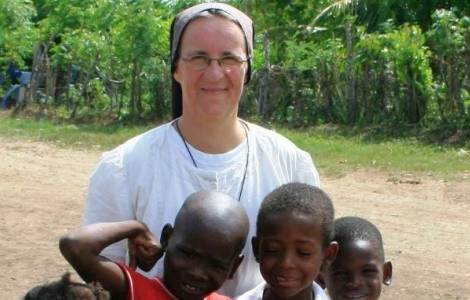
Port-au-Prince (Agenzia Fides) - "Difficult" is how Sister Marcella Catozza of the Franciscan Sisters of Busto Arsizio, who has been working in Haiti for 20 years, describes the situation of the Church in the Caribbean country ravaged by violence from criminal gangs. “The situation of the Church is just as difficult as the general reality in Haiti. The Church reflects the reality of the country," says Sister Marcella. "Difficult because connections are difficult, because it is difficult to meet and work together. Everyone is a little isolated. Everyone is on their own and tries to build ties where they can", explains the nun, who works in one of the slums of Port-au-Prince (see Fides, 26/2/2024).
A Church that has been suffering for a long time, emphasizes Sister Marcella: "Recently, Bishop Dumas Anse-à-Veau Miragoâne was the victim of an explosive attack (see Fides, 11/3/2024), but before that it was the earthquake that severely affected the Church with the deaths of the archbishop, the vicar, the chancellor and the secretary of the Archdiocese of Port-au-Prince. Seminaries were destroyed and entire communities lost their seminarians. So the Church in Haiti has suffered and continues to suffer."
The phenomenon of voodoo is still widespread in Haiti today. "It is said that in Haiti eighty percent of the population are Catholics and one hundred percent follow voodoo," says Sister Marcella. "Religious syncretism is very strong, even among devout Catholics, so that the traditional voodoo culture is present everywhere. Before you go to the doctor, for example, but you can also die because he carries out dangerous practices." "Christianity has not reached the core of Haitian culture, in the sense of the way people live. Until we get to that level, we can stick to one form: the churches in Haiti are full, and if you don't go two hours before on Sundays when mass begins, you have to bring your own chair from home and stay in the church parking lot to attend Mass. It is not a problem of the number of believers, it's a problem of faith formation," says the religious. "Voodoo and the Catholic faith follow two different paths, but they coexist in the same people, who may be ardent Catholics who pray several rosaries a day and then practice voodoo because they say it is part of their culture," explains sister Marcella. Despite their shared culture, says the nun, "Haitians find it difficult to recognize themselves as a unified people." "Their unity always comes from being against something," explains Sister Marcella. "They have never united, not to build something, but to be against it. Against the whites, against the French, now against the Prime Minister. Haitians are struggling to find an identity as a people because they never had it." Sister Marcella, who is not currently in Haiti, still sees a light of hope. "After years of work, the people who work with us have finally recognized that we are there to build something. After 20 years, we employ around 80 people, educators, teachers and service staff who run a kindergarten, a primary school, a home for 150 children, 40 of whom are disabled. I am the first to be amazed at how they show themselves capable of moving forward, even without my presence". It was only when 'the white man' left that their true humanity came to the fore: They perceive this work as their own, they risk their lives to go to work because they have to cross streets that are the scene of shootings and gang checkpoints, that can shoot you just because they feel like it. Just to give you an example: The head of the dormitory can no longer take the normal route because the gangsters won't let him pass. So he found an alternative route that leads through a river with sewage. He has spare clothes in his backpack so that when he comes out of the sewers, he washes himself with sea water (we are by the sea), puts on his clothes and gets to work. A person does this not because of his salary, but because all these children who are now in need depend on him." (L.M.) (Agenzia Fides, 20/3/2024)